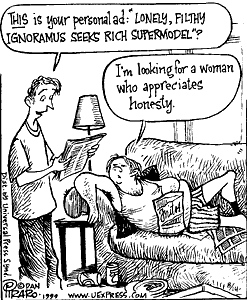Narcissism at a Glance
- What is pathological Narcissism
- Origins of pathological narcissism
- Narcissistic regression and the formation of secondary narcissism
- Primitive defense mechanisms
- The dysfunctional family
- The issue of separation and individuation
- Childhood traumas and the development of the development of the narcissistic personality
- Freud versus Jung
- Kohut's approach
- Karen Horney's contributions
- Otto Kernberg
- Bibliography
- Watch the video on Pathological Narcissism
What is Pathological Narcissism?
Primary Narcissism, in psychology is a defense mechanism, common in the formative years (6 months to 6 years old). It is intended to shield the infant and toddler from the inevitable hurt and fears involved in the individuation-separation phase of personal development.
Secondary or pathological narcissism is a pattern of thinking and behaving in adolescence and adulthood, which involves infatuation and obsession with one's self to the exclusion of others. It manifests in the chronic pursuit of personal gratification and attention (narcissistic supply), in social dominance and personal ambition, bragging, insensitivity to others, lack of empathy and/or excessive dependence on others to meet his/her responsibilities in daily living and thinking. Pathological narcissism is at the core of the narcissistic personality disorder.
The term narcissism was first used in relation to human psychology by Sigmund Freud after the figure of Narcissus in Greek mythology. Narcissus was a handsome Greek youth who rejected the desperate advances of the nymph Echo. As a punishment, he was doomed to fall in love with his own reflection in a pool of water. Unable to consummate his love, Narcissus pined away and changed into the flower that bears his name, the narcissus.
Other major psychiatrists who contributed to the theory are Melanie Klein, Karen Horney, Heinz Kohut, Otto F. Kernberg, Theodore Millon, Elsa F. Ronningstam, John Gunderson, Robert Hare, and Stephen M. Johnson.
Origins of pathological narcissism
Whether pathological narcissism is the result of genetic programming (see Jose Lopez, Anthony Bemis and others) or of dysfunctional families and faulty upbringing or of anomic societies and disruptive socialisation processes - is still an unresolved debate. The scarcity of scientific research, the fuzziness of the diagnostic criteria and the differential diagnoses make it unlikely that this will be settled soon one way or the other.
Certain medical conditions can activate the narcissistic defense mechanism. Chronic ailments are likely to lead to the emergence of narcissistic traits or a narcissistic personality style. Traumas (such as brain injuries) have been known to induce states of mind akin to full-blown personality disorders.
Such "narcissism", though, is reversible and tends to be ameliorated or disappear altogether when the underlying medical problem does. Psychoanalysis teaches that we are all narcissistic at an early stage of our lives. As infants and toddlers we all feel that we are the centre of the Universe, the most important, omnipotent and omniscient beings. At that phase of our development, we perceive our parents as mythical figures, immortal and awesomely powerful but there solely to cater to our needs, to protect and nourish us. Both Self and others are viewed immaturely, as idealisations. This, in the psychodynamic models, is called the phase of "primary" narcissism.
Inevitably, the inexorable conflicts of life lead to disillusionment. If this process is abrupt, inconsistent, unpredictable, capricious, arbitrary and intense, then the injuries sustained by the infant's self-esteem are severe and often irreversible. Moreover, if the empathic crucial support of our caretakers (the Primary Objects, e.g., the parents) is absent, our sense of self-worth and self-esteem in adulthood tends to fluctuate between over-valuation (idealisation) and devaluation of both Self and others. Narcissistic adults are widely thought to be the result of bitter disappointment, of radical disillusionment in the significant others in their infancy. Healthy adults realistically accept their self-limitations and successfully cope with disappointments, setbacks, failures, criticism and disillusionment. Their self-esteem and sense of self-worth are self-regulated and constant and positive, not substantially affected by outside events.
Narcissistic regression and the formation of secondary narcissism
Research shows that when an individual (at any age) encounters an insurmountable obstacle to his or her orderly progression from one stage of personal development to another, he or she regresses to his infantile-narcissistic phase rather than circumvent the hindrance (Gunderson-Ronningstam, 1996).
While in regression, the person displays childish, immature behaviors. He feels that he is omnipotent, and misjudges his power and that of his opposition. He underestimates challenges facing him and pretends to be "Mr. Know-All". His sensitivity to the needs and emotions of others and his ability to empathise with them deteriorate sharply. He becomes intolerably haughty and arrogant, with sadistic and paranoid tendencies. Above all, he then seeks unconditional admiration, even when he does not deserve it. He is preoccupied with fantastic, magical thinking and daydreams. In this mode he tends to exploit others, to envy them, and to be explosive.
The main function of such reactive and transient secondary narcissism is to encourage the individual to engage in magical thinking, to wish the problem away or to enchant it or to tackle and overcome it from a position of omnipotence.
A personality disorder arises only when repeated attacks on the obstacle continue to fail -- especially if this recurrent failure happens during the formative stages (0-6 years of age). The contrast between the fantastic world (temporarily) occupied by the individual and the real world in which he keeps being frustrated (the grandiosity gap) is too acute to countenance for long. The dissonance gives rise to the unconscious "decision" to go on living in the world of fantasy, grandiosity and entitlement.
The dynamics of narcissism
Primitive defense mechanisms
Narcissism is a defense mechanism related to the splitting defense mechanism. The Narcissist fails to regard other people, situations, or entities (political parties, countries, races, his workplace) as a compound of good and bad elements. He either idealises his object - or devalues it. The object is either all good or all bad. The bad attributes are always projected, displaced, or otherwise externalised. The good ones are internalised in order to support the inflated (grandiose) self-concepts of the narcissist and his grandiose fantasies - and to avoid the pain of deflation and disillusionment.
The narcissist pursues narcissistic supply (attention, both positive and negative) and uses it to regulate his fragile and fluctuating sense of self-worth.
The dysfunctional family
Research shows that most narcissists are born into dysfunctional families. Such families are characterised by massive denials, both internal ("you do not have a real problem, you are only pretending") and external ("you must never tell the secrets of the family to anyone"). Abuse in all forms is not uncommon in such families. These families may encourage excellence, but only as means to a narcissistic end. The parents are usually themselves needy, emotionally immature, and narcissistic and thus unable to recognize or respect the child's emerging boundaries and emotional needs. This often leads to defective or partial socialisation and to problems with sexual identity.
The issue of separation and individuation
According to psychodynamic theories of personal development, parents (primary objects) and, more specifically, mothers are the first agents of socialisation. It is through his mother that the child explores the most important questions, the answers to which will shape his entire life. Later on, she is the subject of his nascent sexual cravings (if the child is a male) - a diffuse sense of wanting to merge, physically, as well as spiritually. This object of love is idealised and internalised and becomes part of our conscience (the superego in the psychoanalytic model).
Growing up entails the gradual detachment from the mother and the redirection of the sexual attraction from her to other, socially appropriate objects. These are the keys to an independent exploration of the world, to personal autonomy and to a strong sense of self. If any of these phases is thwarted (sometimes by the mother herself, who won't "let go") the process of differentiation or separation-individuation is not successfully completed, autonomy and a coherent sense of self are not achieved and the person is characterized by dependence and immaturity.
It is by no means universally accepted that children go through a phase of separation from their parents and through the consequent individuation. Scholars like Daniel Stern, in his book, "The Interpersonal World of the Infant" (1985), concludes that children possess selves and are separated from their caregivers from the very start.
Childhood traumas and the development of the narcissistic personality
Early childhood abuse and traumas trigger coping strategies and defense mechanisms, including narcissism. One of the coping strategies is to withdraw inwards, to seek gratification from a secure, reliable and permanently-available source: from one's self. The child, fearful of further rejection and abuse, refrains from further interaction and resorts to grandiose fantasies of being loved and self-sufficient. Repeated hurt may lead to the development of a narcissistic personality.
Schools of Thought
Freud versus Jung
Sigmund Freud (1856-1939) is credited for the first coherent theory of narcissism. He described transitions from subject-directed libido to object-directed libido through the intermediation and agency of the parents. To be healthy and functional, the transitions must be smooth and unperturbed; otherwise neuroses result. Thus, if a child fails to attract their love and attention of his or her desired objects (e.g., of his parents), the child regresses to the narcissistic phase.
The first occurrence of narcissism is adaptive in that it trains the child to love an available object (his or her self) and to feel gratified. But regressing from a later stage to "secondary narcissism" is maladaptive. It is an indication of failure to direct the libido to the "right" targets (to objects, such as the child's parents).
If this pattern of regression persists, a "narcissistic neurosis" is formed. The narcissist stimulates his self habitually in order to derive pleasure and gratification. The narcissist prefers fantasy to reality, grandiose self-conception to realistic appraisal, masturbation and sexual fantasies to mature adult sex and daydreaming to real life achievements.
Carl Gustav Jung (1875-1961) pictured the psyche as a repository of archetypes (conscious representations of adaptive behaviors). Fantasies are a way of accessing these archetypes and releasing them. In Jungian psychology, regressions are compensatory processes intended to enhance adaptation, not methods of obtaining or securing a steady flow of gratification.
Freud and Jung also disagree about introversion. Introversion is indispensable to narcissism, while extroversion is a necessary condition for orienting to a libidinal object. Freud regards introversion as an instrument in the service of a pathology. Jung, in contrast, regards introversion as a useful tool in the service of the endless psychic quest for adaptation strategies (narcissism being one such strategy).
Nevertheless, even Jung acknowledged that the very need for a new adaptation strategy means that adaptation has failed. So although introversion per se is by definition not pathological, the use made of it can be pathological.
Jung distinguished introverts (those who habitually concentrate on their selves rather than on outside objects) from extroverts (the opposite). Introversion is considered a normal and natural function in childhood, and remains normal and natural even if it dominates later mental life. To Jung, pathological narcissism is a matter of degree: it is exclusive and all-pervasive.
Kohut's Approach
Heinz Kohut said that pathological narcissism is not the result of excessive narcissism, libido or aggression. It is the result of defective, deformed or incomplete narcissistic (self) structures. Kohut postulated the existence of core constructs which he named: the Grandiose Exhibitionistic Self and the Idealised Parent Imago. Children entertain notions of greatness (primitive or naive grandiosity) mingled with magical thinking, feelings of omnipotence and omniscience and a belief in their immunity to the consequences of their actions. These elements and the child's feelings regarding its parents (which are also painted by it with a brush of omnipotence and grandiosity) - coalesce and form these constructs.
The child's feelings towards its parents are reactions to their responses (affirmation, buffering, modulation or disapproval, punishment, even abuse). Their responses help maintain the child's self-structures. Without the appropriate responses, grandiosity, for instance, cannot be transformed into adult ambitions and ideals.
To Kohut, grandiosity and idealisation are positive childhood development mechanisms. Even their reappearance in transference should not be considered a pathological narcissistic regression.
Kohut says that narcissism (subject-love) and object-love coexist and interact throughout life. He agrees with Freud that neuroses are accretions of defence mechanisms, formations, symptoms, and unconscious conflicts. But he identified a whole new class of disorders: the self-disorders. These are the result of the perturbed development of narcissism.
Self disorders are the results of childhood traumas of either not being "seen", or of being regarded as an "extension" of the parents, a mere instrument of gratification. Such children develop to become adults who are not sure that they do exist (lack a sense of self-continuity) or that they are worth anything (lack of stable sense of self-worth, or self-esteem).
Karen Horney's contributions
Horney said that personality was shaped mostly by environmental issues, social or cultural. Horney believed that people (children) needed to feel secure, to be loved, protected, emotionally nourished and so on. Horney argued that anxiety is a primary reaction to the very dependence of the child on adults for his survival. Children are uncertain (of love, protection, nourishment, nurturance), so they become anxious.
Defenses such as narcissism are developed to compensate for the intolerable and gradual realisation that adults are merely human: capricious, unfair, unpredictable, non-dependable. Defences provide both satisfaction and a sense of security.
Otto Kernberg
Otto Kernberg (1975, 1984, 1987) is a senior member of the Object Relations school in Psychology (comprising also Kohut, Klein, and Winnicott). Kernberg regards as artificial the division between Object Libido (energy directed at people) and Narcissistic Libido (energy directed at the self). Whether the child develops a normal or a pathological form of narcissism depends on the relations between the representations of the self (the image of the self that the child forms in his or her mind) and the representations of objects (the images of other people that the child forms in his or her mind). It is also dependent on the relationship between the representations of the self and real objects. The development of pathological narcissism is also determined by instinctual conflicts related both to the libido and to aggression.
Kernberg's concept of Self is closely related to Freud's concept of Ego. The Self is dependent upon the unconscious, which exerts a constant influence on all mental functions. Pathological narcissism, therefore, reflects a libidinal investment in a pathologically structured Self and not in a normal, integrative structure of the Self. The narcissist suffers from a Self, which is devalued or fixated on aggression.
All object relations of such a pathological Self are detached from the real objects (because they often cause hurt and narcissistic injury) and involve dissociation, repression, or projection onto other objects. Narcissism is not merely a fixation on an early developmental stage. It is not confined to the failure to develop intra-psychic structures. It is an active, libidinal investment in a deformed structure of the Self.
next: Narcissistic Personality Disorder Tips
Bibliography
-
- Alford, C. Fred - Narcissism: Socrates, the Frankfurt School and Psychoanalytic Theory - New Haven and London, Yale University Press - 1988 ISBN 0300040644
- Fairbairn, W. R. D. - An Object Relations Theory of the Personality - New York, Basic Books, 1954 ISBN 0465051634
- Freud S. - Three Essays on the Theory of Sexuality (1905) - Standard Edition of the Complete Psychological Works of Sigmund Freud - Vol. 7 - London, Hogarth Press, 1964 ISBN 0465097081
- Freud, S. - On Narcissism - Standard Edition - Vol. 14 - pp. 73-107
- Golomb, Elan - Trapped in the Mirror : Adult Children of Narcissists in Their Struggle for Self - Quill, 1995 ISBN 0688140718
- Greenberg, Jay R. and Mitchell, Stephen A. - Object Relations in Psychoanalytic Theory - Cambridge, Mass., Harvard University Press, 1983 ISBN 0674629752
- Grunberger, Bela - Narcissism: Psychoanalytic Essays - New York, International Universities Press - 1979 ISBN 0823634914
- Guntrip, Harry - Personality Structure and Human Interaction - New York, International Universities Press - 1961 ISBN 0823641201
- Horowitz M.J. - Sliding Meanings: A defense against threat in narcissistic personalities - International Journal of Psychoanalytic Psychotherapy - 1975;4:167
- Jacobson, Edith - The Self and the Object World - New York, International Universities Press - 1964 ISBN 0823660605
- Kernberg O. - Borderline Conditions and Pathological Narcissism - New York, Jason Aronson, 1975 ISBN 0876681771
- Klein, Melanie - The Writings of Melanie Klein - Ed. Roger Money-Kyrle - 4 vols. - New York, Free Press - 1964-75 ISBN 0029184606
- Kohut H. - The Analysis of the Self - New York, International Universities Press, 1971 ISBN 0823601455
- Lasch, Christopher - The Culture of Narcissism - New York, Warner Books, 1979 ISBN 0393307387
- Lowen, Alexander - Narcissism : Denial of the True Self - Touchstone Books, 1997 ISBN 0743255437
- Millon, Theodore (and Roger D. Davis, contributor) - Disorders of Personality: DSM IV and Beyond - 2nd ed. - New York, John Wiley and Sons, 1995 ISBN 047101186X
- Millon, Theodore - Personality Disorders in Modern Life - New York, John Wiley and Sons, 2000 ISBN 0471237345
- Ronningstam, Elsa F. (ed.) - Disorders of Narcissism: Diagnostic, Clinical, and Empirical Implications - American Psychiatric Press, 1998 ISBN 0765702592
- Rothstein, Arnold - The Narcissistic Pursuit of Reflection - 2nd revised ed. - New York, International Universities Press, 1984
- Schwartz, Lester - Narcissistic Personality Disorders - A Clinical Discussion - Journal of Am. Psychoanalytic Association - 22 (1974): 292-305
- Stern, Daniel - The Interpersonal World of the Infant: A View from Psychoanalysis and Developmental Psychology - New York, Basic Books, 1985 ISBN 0465095895
- Vaknin, Sam - Malignant Self Love - Narcissism Revisited - Skopje and Prague, Narcissus Publications, 1999-2005 ISBN 8023833847
- Zweig, Paul - The Heresy of Self-Love: A Study of Subversive Individualism - New York, Basic Books, 1968 ISBN 0691013713
next: Narcissistic Personality Disorder Tips
 Review the following 'Questions To Ask' about bipolar disorder so you're prepared to discuss this important health issue with your health care professional.
Review the following 'Questions To Ask' about bipolar disorder so you're prepared to discuss this important health issue with your health care professional.


 At last. . . An interactive workshop designed to help you fit the pieces of the relationship puzzle together in a healthy way; an inspirational gathering of people interested in transforming their present relationships into extraordinary love relationships!
At last. . . An interactive workshop designed to help you fit the pieces of the relationship puzzle together in a healthy way; an inspirational gathering of people interested in transforming their present relationships into extraordinary love relationships!